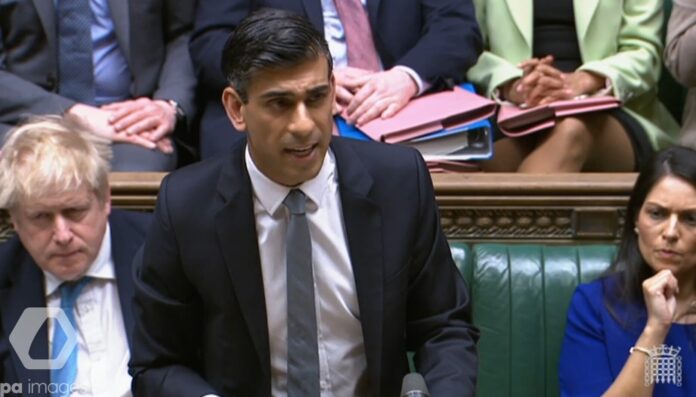Trying to soften the effect of inflation, the Chancellor announced tax cutting plans in his Spring statement this afternoon
Rishi Sunak announced that he was increasing the threshold at which workers start to pay national insurance contributions by £3,000 to £12,750 describing it as a £6 billion pound personal tax cut for 30 million people across the United Kingdom,”adding the cut was equivalent to more than 330 pounds a year per worker, making it the largest single personal tax cut in a decade.
Fuel Duty was cut for the first time in over 20 years with 5p off a litre to be brought in from 6.00pm tonight promiseda reduction of one pence in the pound in the basic rate of income tax in 2024
There will be £500m extra for councils to help the poorest raising that figure now to £1 billion
The forecasts drawn up by the Office for Budget Responsibility (OBR) showed the economy was likely to grow by 3.8% in 2022, a sharp slowdown from a forecast of 6.0% made in October.Inflation, as measured by the consumer price index, is now seen at 7.4% in 2022, compared with October’s forecast of 4.0%.
The OBR forecast that gross domestic product would grow by 1.8%, 2.1% and 1.8% in 2023, 2024 and 2025.
Reacting to the ammouncements Mayor of Greater Manchester Andy Burnham wrote on twitter “Is “levelling up” still the core mission of this Government? Doesn’t sound like it while Greater Manchester’s Night Time economy Czar Sacha Lord wrote
2 years ago, The Chancellor said he would stand by business.Today, Hospitality didn’t need a handout, it needed a freeze in VAT.He’s ignored the industry.More businesses will now close, creating more redundancies across the UK.Reckless, harmful and shortsighted.
Early analysis showed that today’s tax cuts will offset around one-sixth of the tax rises Sunak has brought in during last two years, according to OBR
It also said that it expects real household disposable income – about the most comprehensive measure of our standard of living – to fall this year at the fastest rate since comparable records began in the 1950s.
Erica Roscoe, a senior research fellow at IPPR North said:
“Across the North we’ve seen in work poverty increase over the last decade and we now find ourselves facing the most significant cost of living crisis in a generation which is inevitably going to see the 3.5 million people across the North fall deeper into poverty despite being in work, alongside thousands more as prices increase while wages remain the same.
“The Chancellor had the opportunity today to support those on the lowest incomes – people who are going to be hit the hardest by this crisis – by using our social security system effectively and he has chosen not to do so. Those on the lowest incomes need to be offered support most urgently through measures like re-instating the Universal Credit uplift and increasing the value and eligibility of support for those hardest hit”.
Adrian Young, tax partner at accounting and business advisory firm HURST, said:
“The Chancellor’s Spring Statement was an interesting set of measures for unusual times. Some key initiatives were announced as part of Mr Sunak’s ‘Tax Plan’ to deal with the cost of living crisis, driven in part by the Ukrainian war, and manifesting itself in the highest inflation rate in 30 years.
Three measures in particular stand out: the anticipated 5p per litre reduction in fuel duty, the increase in the threshold at which national insurance contributions become payable, and a future potential 1p reduction in the basic rate of income tax.
Looking at these in turn, the fuel duty reduction will no doubt be welcome. But, with forecourt prices fluctuating wildly, it remains to be seen whether this reduction actually makes its way fully into pump prices.
The increase in the threshold at which national insurance contributions kick in should have a more measurable benefit. Interestingly, it’s only now that the national insurance threshold has been aligned with the income tax threshold, thereby also rectifying a long-standing anomaly in the UK tax system.
What remains to be seen, however, is whether the benefits from the increase in the threshold are eroded, or even entirely negated, by the simultaneous 1.25 per cent increase in the Health and Social Care Levy.
As a result, the change in the threshold may end up more like the softening of an overall increase in tax, rather than an actual reduction.
A 1p reduction in income tax by the end of this parliament will no doubt be seen in a positive light. Mr Sunak didn’t appear to make a firm commitment to the reduction.
Rather, I think it should be seen more as a keenly held objective of the Chancellor’s and which he may deliver depending on economic (and no doubt political) circumstances. Time will tell whether this comes to fruition.”
Dave Innes, Head of Economics at the Joseph Rowntree Foundation, said:
“Security is only real if it’s for everyone – the choices the Chancellor has made today won’t deliver any security for those at the sharpest end of this crisis, instead he has abandoned many to the threat of destitution.
“The Chancellor has acted recklessly in pressing ahead with a second real-terms cut to benefits in six months, while prioritising people on middle and higher incomes.
“Changes to National Insurance won’t help those who aren’t working or can’t work due to disability, illness or caring responsibilities, and exposes them to an increased risk of becoming destitute. This means they will face regularly going without absolute essentials such as food, energy and basic hygiene products.
“We can’t build a strong or secure economy by weakening the incomes of the poorest. With benefits reaching their lowest level in real terms since 1985, the Chancellor had ample opportunity with his increased headroom to uprate them in line with inflation to protect those most at risk.
“The Household Support Fund is a drop in the ocean when we consider the number of people who will reach crisis point in the coming months, from the pressure of energy bills alone.
“The Chancellor has asked us to judge him on his actions over the past two years, and while some of his previous choices have helped the worst off, he now risks plunging many into destitution.
“Make no mistake – this dire situation will leave millions in despair as a direct consequence of the Chancellor’s irresponsible choices today”.







